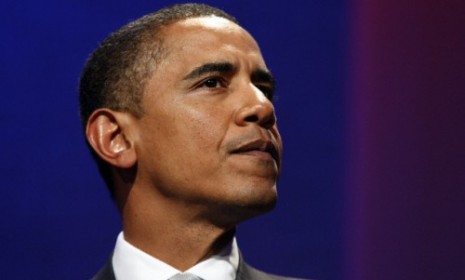'Has Obama hit bottom?'
Michael Hirsh says in Newsweek that the president may have reached a low point, so Democrats' prospects have nowhere to go but up between now and November

A free daily email with the biggest news stories of the day – and the best features from TheWeek.com
You are now subscribed
Your newsletter sign-up was successful
A common refrain in Washington is that President Obama's sinking popularity is setting up his fellow Democrats for a drubbing in November midterm elections. But author Michael Hirsh says in Newseek that, after a relentless barrage of bad press, Obama may have sunk so low that the slightest hint of improvement -- on the economy, on health care, on the wars in Iraq and Afghanistan -- could save Democrats from catastrophe:
"At this juncture in his presidency, Barack Obama might think about taking his political cue from the title of Richard Fariña's 1960s novel: Been Down So Long It Looks Like Up to Me. In the race to the bottom that American politics has become -- the only question is which party will be less popular going into the November election -- Obama's been written off so completely that the Democrats' electoral prospects may be starting to look up simply because they can't drop much lower.
"True, with the congressional elections still eight months away, it's impossible to say whether this is some kind of a bottom or a turning point. Many unknowns could still turn November into the rout against the Democrats that everyone now expects: soaring gas prices, double-dip recession, a terrorist setback. But consider: after months of failures and embarrassing White House miscalculations, some very serious downward trend lines are starting to stabilize or even poke upward."
The Week
Escape your echo chamber. Get the facts behind the news, plus analysis from multiple perspectives.

Sign up for The Week's Free Newsletters
From our morning news briefing to a weekly Good News Newsletter, get the best of The Week delivered directly to your inbox.
From our morning news briefing to a weekly Good News Newsletter, get the best of The Week delivered directly to your inbox.
Read the full story -- "Has Obama hit bottom?" -- here.
A free daily email with the biggest news stories of the day – and the best features from TheWeek.com
-
 Political cartoons for February 16
Political cartoons for February 16Cartoons Monday’s political cartoons include President's Day, a valentine from the Epstein files, and more
-
 Regent Hong Kong: a tranquil haven with a prime waterfront spot
Regent Hong Kong: a tranquil haven with a prime waterfront spotThe Week Recommends The trendy hotel recently underwent an extensive two-year revamp
-
 The problem with diagnosing profound autism
The problem with diagnosing profound autismThe Explainer Experts are reconsidering the idea of autism as a spectrum, which could impact diagnoses and policy making for the condition
-
 The billionaires’ wealth tax: a catastrophe for California?
The billionaires’ wealth tax: a catastrophe for California?Talking Point Peter Thiel and Larry Page preparing to change state residency
-
 Bari Weiss’ ‘60 Minutes’ scandal is about more than one report
Bari Weiss’ ‘60 Minutes’ scandal is about more than one reportIN THE SPOTLIGHT By blocking an approved segment on a controversial prison holding US deportees in El Salvador, the editor-in-chief of CBS News has become the main story
-
 Has Zohran Mamdani shown the Democrats how to win again?
Has Zohran Mamdani shown the Democrats how to win again?Today’s Big Question New York City mayoral election touted as victory for left-wing populists but moderate centrist wins elsewhere present more complex path for Democratic Party
-
 Millions turn out for anti-Trump ‘No Kings’ rallies
Millions turn out for anti-Trump ‘No Kings’ ralliesSpeed Read An estimated 7 million people participated, 2 million more than at the first ‘No Kings’ protest in June
-
 Ghislaine Maxwell: angling for a Trump pardon
Ghislaine Maxwell: angling for a Trump pardonTalking Point Convicted sex trafficker's testimony could shed new light on president's links to Jeffrey Epstein
-
 The last words and final moments of 40 presidents
The last words and final moments of 40 presidentsThe Explainer Some are eloquent quotes worthy of the holders of the highest office in the nation, and others... aren't
-
 The JFK files: the truth at last?
The JFK files: the truth at last?In The Spotlight More than 64,000 previously classified documents relating the 1963 assassination of John F. Kennedy have been released by the Trump administration
-
 'Seriously, not literally': how should the world take Donald Trump?
'Seriously, not literally': how should the world take Donald Trump?Today's big question White House rhetoric and reality look likely to become increasingly blurred